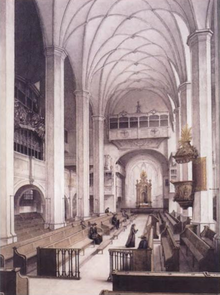| Schwingt freudig euch empor | |
|---|---|
BWV 36 | |
| Church cantata by J. S. Bach | |
 Thomaskirche, Leipzig | |
| Related | based on 36c |
| Occasion | First Sunday in Advent |
| Cantata text | Picander? |
| Chorale | |
| Performed | 2 December 1731: Leipzig |
| Movements | 8 |
| Vocal | SATB choir and solo |
| Instrumental |
|
Johann Sebastian Bach composed the church cantata Schwingt freudig euch empor (Soar joyfully upwards),[1] BWV 36, in Leipzig in 1731 for the first Sunday in Advent. He drew on material from previous congratulatory cantatas, beginning with Schwingt freudig euch empor, BWV 36c (1725). The Gospel for the Sunday was the Entry into Jerusalem, thus the mood of the secular work matched "the people's jubilant shouts of Hosanna". In a unique structure in Bach's cantatas, he interpolated four movements derived from the former works with four stanzas from two important Advent hymns, to add liturgical focus, three from Luther's "Nun komm, der Heiden Heiland" and one from Nicolai's "Wie schön leuchtet der Morgenstern". He first performed the cantata in its final form of two parts, eight movements, on 2 December 1731.